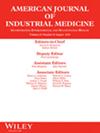Reliability and Validity of the Japanese Version of the Four-Item Psychosocial Safety Climate Scale (PSC-4J)
Abstract
Background
Short measurement scales are increasingly sought-after for reasons of efficiency and survey fatigue. A short four-item measure of an organization's climate for employee psychological health, the psychosocial safety climate (PSC-4), has gained international usage. However, the psychometric properties of its Japanese version (PSC-4J) are unknown. We examined the reliability and validity of the PSC-4J.
Methods
An online survey containing the Japanese 12-item PSC scale (PSC-12J), from which the PSC-4J derived, and relevant variables (job demands, job resources, and outcomes) was administered to 2200 employees registered with a Japanese online survey provider. Two weeks later, the PSC-12J was measured again with a follow-up survey of 1400 respondents. Internal consistency and test-retest reliability were examined by Cronbach's α and intraclass correlation (ICC). Agreement between PSC-4J and PSC-12J was examined by Spearman's correlation. Structural validity was examined by confirmatory factor analysis (CFA) and item response theory (IRT) analysis. Convergent validity was examined by Spearman's correlations of PSC-4J with relevant variables, comparing these results with the PSC-12J.
Results
Cronbach's α and ICC for PSC-4J were 0.91 and 0.68, respectively. Spearman's correlation between PSC-4J and PSC-12J was 0.97. The CFA assuming a one-factor structure showed good model fit. The IRT analysis indicated each PSC-4J item had very high discrimination and appropriate difficulty. Spearman's correlations of PSC-4J with relevant variables were slightly lower than for PSC-12J but in the theoretically expected direction.
Conclusions
The PSC-4J, while slightly inferior to the PSC-12J in psychometric properties, provides comparable measurements with fewer items while maintaining adequate reliability and validity.

 求助内容:
求助内容: 应助结果提醒方式:
应助结果提醒方式:


